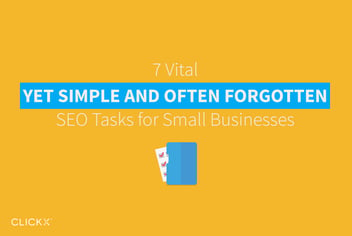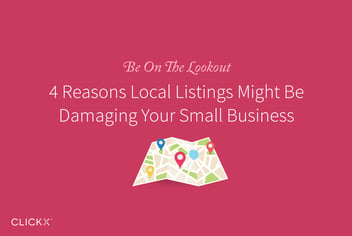Can Doing Your Own SEO Ruin Your Small Business?
The basics of SEO are deceptively simple: Create great content on a regular schedule, take care of a few seemingly obvious on-page optimization elements, actively hunt down links, and the world will beat a path to your door. Couldn’t be easier, right?
It’s exactly that seeming simplicity that tempts many small business owners into believing they can handle the entire process of optimizing their sites while executing a proper offline SEO strategy.
This is fine in theory, but in practice there are serious risks for small business owners when doing their own SEO. In this article, we’ll cover potential pitfalls that might arise when taking things on yourself. Use these to steer clear of accidentally ruining your own small business’ chances of success online.
Let’s get going!

Avoid Low-Quality or Spammy Content
Google relies on content signals to determine the quality of your content, and their definition of what actually constitutes quality changes constantly. If you’re handling your own SEO strategy, you may not always have the time to keep up to speed on what the current quality yardsticks are.
Many small business owners have fallen victim to this over the years. Google’s Panda update, for example, brought the hammer down on sites that hadn’t invested enough resources in high-quality content. The Hummingbird update nudged content strategy towards matching searcher intent and creating mobile-friendly content.
While Google’s exact current requirements will always shift, their core set of desires remains consistent over the years:
- Ensure all of your pages are created for your users, not the search engines.
- Avoid using tricks to game the algorithm.
- Invest in unique content that makes you the authority in your area.
If you’re handling your own content creation, stick to those core principles and you should be in good shape for any future Google updates.
Bad Links Will Kill Your Authority
If there is one area of SEO that small business owners consistently underestimate the difficulty of, it’s overall link strategy. Both the websites you link out to and those that link to you will play a crucial role in your overall rankings.
Link building is a tough process, and it’s even harder to get right if you don’t have the time to throw dedicated resources at it. When building links in the local space you’re going to need to aim for quality links that are relevant to your business type.
For many small business owners trying to balance handling their own SEO with the demands of the rest of their business, the temptation is to settle for less than high-quality links in the hope that volume will make up for lack of quality. This is a dangerous road to go down, and obtaining the right kind of backlinks is far more important than the overall number of incoming links.
You’ll need to test different approaches and track the growth of your link profile over time to really get this right. If that’s not a project you can devote adequate resources to, seriously consider outsourcing it.
Avoid Excessive Optimization
Handling your own SEO strategy can be a nerve-wracking business. In the desire to please Google, many small business owners make the mistake of trying too hard by over-optimizing their content. As we mentioned at the outset, Google is looking for content that solves people’s problems, rather than poorly written pieces stuffed with keywords.
As a savvy site owner, you’re hopefully already aware of the dangers of obvious keyword stuffing. It’s simply not going to fly these days and you risk a penalty by even attempting it. What you might not be aware of if you’re handling your own SEO is the range of other over-optimization risks you could fall foul of.
Making full use of handy tools like the Google Search Console will help you avoid many of the perils of over-optimization but, as with our previous points, you need to seriously consider whether optimization is really a task you should be concentrating on yourself.
Avoidable Technical Hiccups Can Cripple Progress
Effective SEO is a content-driven game these days, but it retains a strong technical element. If you’re handling your own SEO and not bringing the right technical tools to the table, you risk inadvertently damaging your site’s chances of success. The range of common technical errors you can fall foul of is a wide one, so you need to consider whether you are really the best person to be in charge of overall implementation.
This is an area that can be potentially bewildering to less technically savvy site owners, but is usually a matter of little more than a few simple checklists to go through for SEO professionals. Paying an expert to take care of this quickly (rather than blundering through options yourself) is a sensible approach for most small businesses.
SEO Specialization Brings Results
[Tweet “SEO is like playing a board game where the rules change each time you take a turn.”]
As a small business owner, SEO is inevitably not going to be your full-time job. Companies who do SEO for a living are able to test out new strategies across a range of sites and glean valuable, generally applicable information from their data. Your website is likely to be at the core of your revenue generation so it’s not an area where you want to be unnecessarily experimenting or taking risks.
Bearing in mind that something as simple as a website re-design can tank your entire SEO strategy, this is an area where it really pays to build on the successes of others. Taking on a dedicated expert to handle SEO doesn’t just free up a lot of your valuable time, it also gives you a much greater chance of consistently staying on target in terms of current best practices and tactics.
Conclusion
Doing your own SEO is certainly possible and the sort of detailed guides available on sites like our very own (naturally!) and Moz will definitely steer you in the right direction.
If you’re running a small business, it’s unlikely that you’ll have the time to personally take care of this effectively. The risk of dropping the ball in terms of optimization, link building or technical SEO is simply too great to run in most cases. You’re also potentially competing against other local firms with dedicated SEO teams in place.
To sum up, doing your own SEO is unlikely to ruin your small business but it may unnecessarily damage its chances of success. Our advice is to seriously consider turning this over to the professionals.
Have you tried handling your own SEO strategy in the past and got any lessons to share? Get in touch via the comments and let us know!






